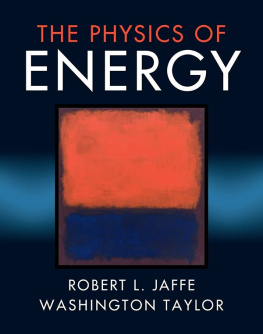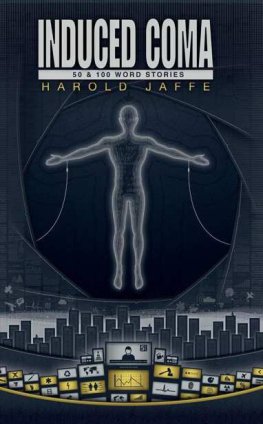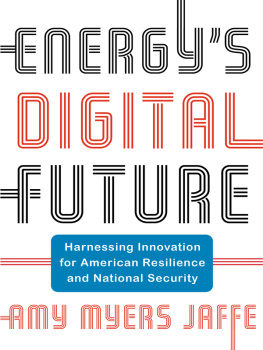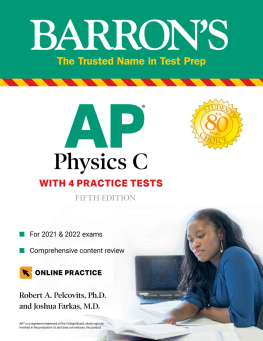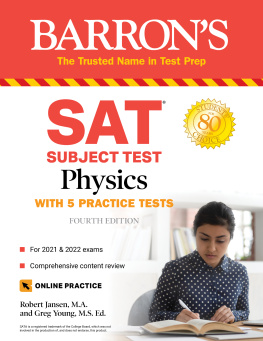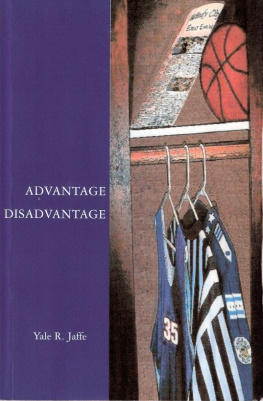Jaffe Robert L. - The Physics of Energy
Here you can read online Jaffe Robert L. - The Physics of Energy full text of the book (entire story) in english for free. Download pdf and epub, get meaning, cover and reviews about this ebook. City: Cambridge;United Kingdom, year: 2018, publisher: Cambridge University Press, genre: Children. Description of the work, (preface) as well as reviews are available. Best literature library LitArk.com created for fans of good reading and offers a wide selection of genres:
Romance novel
Science fiction
Adventure
Detective
Science
History
Home and family
Prose
Art
Politics
Computer
Non-fiction
Religion
Business
Children
Humor
Choose a favorite category and find really read worthwhile books. Enjoy immersion in the world of imagination, feel the emotions of the characters or learn something new for yourself, make an fascinating discovery.
- Book:The Physics of Energy
- Author:
- Publisher:Cambridge University Press
- Genre:
- Year:2018
- City:Cambridge;United Kingdom
- Rating:3 / 5
- Favourites:Add to favourites
- Your mark:
- 60
- 1
- 2
- 3
- 4
- 5
The Physics of Energy: summary, description and annotation
We offer to read an annotation, description, summary or preface (depends on what the author of the book "The Physics of Energy" wrote himself). If you haven't found the necessary information about the book — write in the comments, we will try to find it.
The Physics of Energy — read online for free the complete book (whole text) full work
Below is the text of the book, divided by pages. System saving the place of the last page read, allows you to conveniently read the book "The Physics of Energy" online for free, without having to search again every time where you left off. Put a bookmark, and you can go to the page where you finished reading at any time.
Font size:
Interval:
Bookmark:
The Physics of Energy
The Physics of Energy provides a comprehensive and systematic introduction to the scientific principles governing energy sources, uses, and systems.
This definitive textbook traces the flow of energy from sources such as solar power, nuclear power, wind power, water power, and fossil fuels through its transformation in devices such as heat engines and electrical generators, to its uses including transportation, heating, cooling, and other applications. The flow of energy through the Earths atmosphere and oceans, and systems issues including storage, electric grids, and efficiency and conservation are presented in a scientific context along with topics such as radiation from nuclear power and climate change from the use of fossil fuels.
Students, scientists, engineers, energy industry professionals, and concerned citizens with some mathematical and scientific background who wish to understand energy systems and issues quantitatively will find this textbook of great interest.
Robert L. Jaffe holds the Morningstar Chair in the Department of Physics at MIT. He was formerly director of MITs Center for Theoretical Physics and recently chaired the American Physical Societys Panel on Public Affairs. Jaffe is best known for his research on the quark substructure of the proton and other strongly interacting particles, on exotic states of matter, and on the quantum structure of the vacuum. He received his BA from Princeton and his PhD from Stanford. In recognition of his contributions to teaching and course development at MIT, Jaffe has received numerous awards including a prestigious MacVicar Fellowship. Jaffe is a member of the American Academy of Arts and Sciences.
Washington Taylor is a Professor of Physics at MIT, and is currently the Director of MITs Center for Theoretical Physics. Taylors research is focused on basic theoretical questions of particle physics and gravity. Taylor has made contributions to our understanding of fundamental aspects of string theory and its set of solutions, including connections to constraints on low-energy field theory and observable physics and to new results in mathematics. Taylor received his BA in mathematics from Stanford and his PhD in physics from UC Berkeley. Among other honors, Taylor has been an Alfred P. Sloan Research Fellow and a Department of Energy Outstanding Junior Investigator, and has received MITs Buechner faculty teaching prize.
A long awaited book which comprehensively covers the fundamentals that engineers, scientists and others specializing in energy related fields need to master. Wonderfully written, it unlocks and presents the science behind energy systems in a pure yet accessible manner, while providing many real world examples to help visualize and frame this knowledge. This book would serve as an excellent text for a foundational course in energy engineering.
Khurram Afridi, Department of Electrical, Computer and Energy Engineering, University of Colorado Boulder
Finding the energy to power a civilization approaching 10 billion people without unacceptable consequences to the environment is the greatest challenge facing humanity this century. This book develops all of the fundamental concepts in physics underlying a quantitative understanding of energy sources, interconversion, and end usage, which are essential parts of meeting this challenge. It will serve as unique and authoritative textbook for the teaching of these topics. ... Overall it is a masterful exposition of the fundamental concepts of physics and their application to the energy-environment problem.
Michael J Aziz, Gene and Tracy Sykes Professor of Materials and Energy Technologies,
Harvard John A. Paulson School of Engineering and Applied Sciences
The textbook by Jaffe and Taylor is an invaluable resource, for instructors and students alike, discussing the physics of energy, a subject that is most important for humankind. ... The book has great potential as a teaching text for emerging courses on energy physics and promises to become a classic for years to come.
Katrin Becker and Melanie Becker, Texas A&M University
Jaffe and Taylor have produced in a single volume a comprehensive text on energy sources, energy conversion technologies, and energy uses from the unifying vantage of physics. Either in a course or in self-study The Physics of Energy can serve as the foundation for an understanding of conventional and renewable energy technologies.
Paul Debevec, Professor Emeritus, Department of Physics, University of Illinois
Jaffe and Taylor have compiled a comprehensive treatise that covers all aspects of energy: its fundamental role in physics, its sources and its uses. In addition to serving as the backbone for a variety of courses, this book should be an invaluable resource for anyone interested in the physics of energy in all of its forms.
David Gross, Chancellors Chair Professor of Theoretical Physics, Kavli Institute for Theoretical
Physics, University of California, Santa Barbara, Joint Winner of the Nobel Prize for Physics, 2004
The book can be very useful as a mid-level textbook, as a survey for self-instruction for the serious-minded energy policy analyst, or as a desk reference covering the physics of the full range of energy topics everything from the energy content of biofuels, to safe nuclear reactor design, to efficient design and placement of wind turbines, to geothermal energy flow, and dozens more topics ... This book very effectively fills a gap between the plentiful simplistic treatments of energy issues and books for full time professionals in the various energy areas.
Rush Holt, CEO of the American Association for the Advancement of Science, former Member of Congress
We live in an age of wonders, when a designer in almost any engineering field can find a dizzying assortment of tools, materials, components, and construction technologies for building. ...The Physics of Energy answers the question of where to begin. No engineers library will be complete without a copy of this literary and intellectual masterpiece. A brilliant story of the foundations of everything.
Steven Leeb, Professor of Electrical Engineering and Computer Science, Massachusetts Institute of Technology
The book is the only comprehensive discussion of energy sources, flows, and uses that I know of. ... It is designed as a text for a college level course, or as a refresher for those who already have the background, and is successful in achieving its goal of introducing the student to the science of energy.
Burton Richter, Paul Pigott Professor in the Physical Sciences, Emeritus and Director Emeritus,
Stanford Linear Accelerator Center, Joint Winner of the Nobel Prize for Physics, 1976
This is a unique textbook: broad, deep, and crucially important for our society. ... [Students] are also inspired by new insights into nature and everyday life: no other energy book covers heat pumps, spark ignition engines, climate change, wave/particle duality and the Big Bang.
Joshua Winn, Princeton University
The Physics of Energy
ROBERT L. JAFFE
Massachusetts Institute of Technology
WASHINGTON TAYLOR
Massachusetts Institute of Technology


Font size:
Interval:
Bookmark:
Similar books «The Physics of Energy»
Look at similar books to The Physics of Energy. We have selected literature similar in name and meaning in the hope of providing readers with more options to find new, interesting, not yet read works.
Discussion, reviews of the book The Physics of Energy and just readers' own opinions. Leave your comments, write what you think about the work, its meaning or the main characters. Specify what exactly you liked and what you didn't like, and why you think so.

